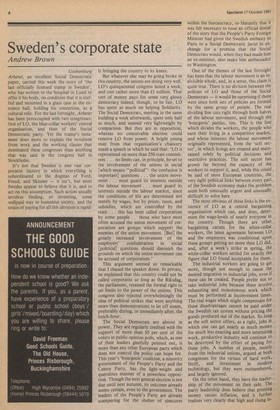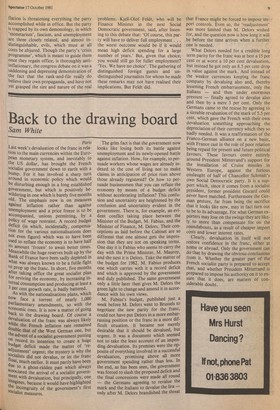Sweden's corporate state
Andrew Brown
Gothenburg Arbetet, an excellent Social Democratic paper, carried this week the story of 'the last officially licensed tramp in Sweden', who has written to the hospital in Lund to offer it his body, on condition that it is stuffed and mounted in a glass case in the entrance hall, holding his concertina, as a cultural relic. For the last fortnight, Arbetet has been preoccupied with two congresses: first of LO, the blue-collar workers' central organisation, and then of the Social Democratic party. Yet the tramp's testament does more to explain the revulsion from work and the working classes that dominated these congresses than anything that was said in the congress hall in Stockholm.
It's not that Sweden is one vast corporatist factory in which everything is subordinated to the dogmas of Ford, Freud, and Skinner — it isn't, but most Swedes appear to believe that it is, and to act on this assumption. Such action usually involves finding, or inventing, some wellpaid way to humanise society, and the strain of paying for all this altruism is rapid ly bringing the country to its knees.
But whatever else may be going broke in this country, the unions are doing very well. LO's quinquennial congress lasted a week, and cost rather more than £1 million. That sort of money pays for some very glossy democracy indeed, though, to be fair, LO has spent as much on helping Solidarity. The Social Democrats, meeting in the same building a week afterwards, spent only half as much, and seemed very lightweight by comparison. But they are in opposition, whereas no conceivable election could remove LO from power. A bright young man from that organisation's chancery made a speech in which he said that: 'LO is represented on more than 250 state committees . . . no limits can, in principle, be set to the involvement of the unions in social [which means "political": the confusion is important] questions . . . the union movement . . . must guard its interests outside the labour movement . . . must guard its interests outside the labour market, since the conditions of life are determined not merely by wages, but by prices, taxes, and subsidies, which are controlled by the state . . . this has been called corporatism by some people . . those who have most often accused the union movement of corporatism are groups which support the enemies of the union movement. [But] the greatly increased involvement of the employers' confederation in social [political] questions should diminish the grounds on which the union movement can be accused of corporatism.'
This argument seemed so remarkable that I chased the speaker down. In private, he explained that this country could not be called corporatist so long as the Riksdag, the parliament, retained the formal right to set limits to the power of the unions. This congress also rejected overwhelmingly the idea of political strikes that were anything more than demonstrations to let off steam, preferably during, or immediately after, the lunch-hour.
The Social Democrats are almost in power. They are regularly credited with the support of more than 50 per cent of the voters in public opinion polls, which, as one of their leaders gleefully pointed out, is more than any other European party which does not control the police can hope for. This year's 'bourgeois' coalition, a minority government of the People's Party and the Centre Party, has the light-weight and querulous manner of a powerless opposition. Though the next general election is not due until next autumn, its outcome already seems certain, even to the government. The leaders of the People's Party are already scampering for the shelter of sinecures within the bureaucracy, so blatantly that it was felt necessary to issue an official denial of the story that the People's Party Foreign Minister had given the Swedish embassy in Paris to a Social Democratic jurist in exchange for a promise that the Social Democrats would, when they had made him an ex-minister, also make him ambassador to Washington.
One of the themes of the last fortnight has been that the labour movement is an indivisible whole, and, in a sense, this claim is quite true. There is no division between the policies of LO and those of the Social Democrats — it would be surprising if there were since both sets of policies are formed by the same group of people. The real dividing line cuts right through both halves of the labour movement, and through the 'bourgeois' parties, too. This is the line which divides the workers, the people who earn their living in a competitive market, and whose interests the labour movement originally represented, from the 'soft sector', in which livings are created and maintained solely by political decisions and restrictive practices. The soft sector has grown far beyond the capacity of the workers to support it, and, while this could be said of most European countries, the very tight political links between every part of the Swedish economy make the problem seem both unusually urgent and unusually difficult to solve here.
The most obvious of these links is the existence of LO as a central bargaining organisation which can, and does, determine the wage-levels of nearly everyone in the country. Though there are other bargaining cartels for the white-collar workers, the latest agreement between LO and the employers was conditional upon these groups getting no more then LO did, and, after a week's strike in spring, the white-collar workers settled for exactly the figure that LO found acceptable for them.
The industrial workers are going to get more, though not enough to cause the desired migration to industrial jobs, even if these can be created. People prefer not to take industrial jobs because these involve exhausting and monotonous work which must be performed at inconvenient times. The real wages which might compensate for these disadvantages cannot be paid under the Swedish tax system without pricing the goods produced out of the market. So long as the soft sector offers, as a right, jobs in which one can get nearly as much money for much less exacting and more interesting work, productive industry will continue to be destroyed by the effort of paying for these jobs. A number of people, mostly from the industrial unions, argued at both congresses for the virtues of hard work, thrift, and investment in modern technology, but they were outnumbered, and largely ignored.
On the other hand, they have the leadership of the movement on their side. The party leadership does believe that printing money causes inflation, and it further realises. very clearly that high and rising in flation is threatening everything the party accomplished while in office. But the party is trapped by its own demonology, in which 'monetarism', fascism, and unemployment are three closely related, and almost indistinguishable, evils, which must at all costs be abjured. Though the party's 'crisis programme', which is meant to guide them once they regain office, is thoroughly antiinflationary, the congress debate on it was a saddening and depressing demonstration of the fact that the rank-and-file really do believe their own propaganda, and have not yet grasped the size and nature of the real problems. Kjell-Olof Feldt, who will be Finance Minister in the next Social Democratic government, said, after listening to this debate that: 'Of course, this party will have to deliver full employment . . . the worst outcome would be if it would mean high deficit spending for a large number of years.' But, given that choice, you would still go for fuller employment? 'Yes. We have no choice'. The gathering of distinguished foreign guests and undistinguished journalists for whom he made these remarks may not have realised their implications. But Feldt did.







































 Previous page
Previous page